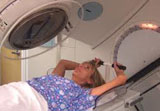Lung Cancer Radiotherapy
Lung cancer is one of the most common types of cancer that affect millions of Americans, and a large number of those affected are due to tobacco smoking. The type of treatment that a lung cancer patient receives depends mostly on how far advanced the disease is, and also on the type of lung cancer. More patients are turning to lung cancer radiotherapy because it treats the problem directly, rather than affecting the body as a whole. Lung cancer radiotherapy can achieve to shrink the tumor, and in addition, patients might also opt for surgery in order to remove such tumor.
Treating Different Types of Lung Cancer
People in general are aware of what lung cancer is and how radiotherapy can help counterattack the damage the cancerous cells are doing. However, the majority may not know that there are actually two main types of lung cancer and they are both treated similarly. The first type of lung cancer is known as ‘Non-small cell lung cancer’ and it’s the most common type, affecting a grand majority of 80% of lung cancer patients. This type of lung cancer can be a squamous cell carcinoma or a large cell undifferentiated carcinoma, which means that there are different types of non-small cell lung cancer as well. The second type of lung cancer is known as ‘Small cell lung cancer’ and it affects the other 20% of lung cancer patients in the United States. This is perhaps the most avoidable type of lung cancer, since the majority of patients develop it due to smoking.
Participating in Clinical Trials
Clinical trials have been conducted for many years by medical researchers and physicians, who are attempting to find new ways to counterattack diseases. Lung cancer radiotherapy and almost any other type of treatment were first conducted as clinical trials before prescribing them to the public. Even today, medical physicians and oncologists all around the world continue to perform clinical trials in order to find newer ways to give lung cancer patients hope. Therefore, if you are suffering from lung cancer and haven’t found an effective type of treatment, you can inquire about clinical trials in your area. It’s critical that you understand that there are risks associated with clinical trials, but every type of lung cancer radiotherapy comes with side effects and risks.
Expecting Side Effects
Whether you receive lung cancer radiotherapy or chemotherapy, you are in risk of suffering from side effects. It’s the oncologist’s responsibility to explain to the patient the possible side effects, even if you have minimum chances of experiencing them. In reality, it can never be predicted accurately if a patient will experience the side effects or not, because every human body is different. Certainly, some people are capable of receiving the entire lung cancer radiotherapy treatment with no side effects at all, while others do experience discomfort. Some of the most common side effects are:
- Fatigue and general discomfort
- Skin irritations
- Difficulty to breathe and swallow
- Loss of chest hair
- Nausea

